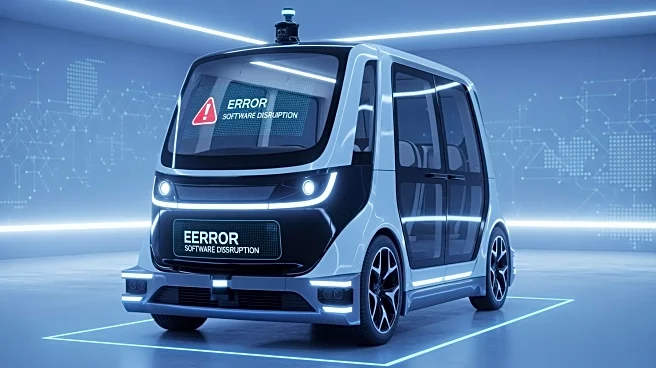What's Happening?
The Jacksonville Transportation Authority (JTA) is facing a significant challenge with its autonomous NAVI shuttle program due to a software issue. Balfour Beatty Construction LLC, the primary contractor, has informed JTA that its software subcontractor,
Oxa, will cease operations in the passenger transport business by the end of the year. This development threatens the self-driving capabilities of the NAVI shuttles, potentially requiring manual operation for up to six months. JTA CEO Nat Ford assured that Balfour Beatty is contractually obligated to find a new software provider, with discussions already underway with companies like Mobileye and ADUS Tech. Ford emphasized that the city will not incur additional costs due to this issue, as protections are in place to enforce Balfour Beatty's performance obligations.
Why It's Important?
The disruption in the NAVI shuttle program highlights the challenges of implementing new technologies in public transportation. The $65 million project aimed to position Jacksonville as a leader in autonomous transit solutions. However, the software setback underscores the risks associated with pioneering unproven technologies. The situation could impact public confidence in autonomous vehicles and influence future investments in similar projects. Councilmember Rory Diamond expressed skepticism about the viability of the project, suggesting a shift towards more established technologies. The outcome of this issue could affect the broader adoption of autonomous transit solutions in other cities, potentially slowing down innovation in the sector.
What's Next?
JTA is actively seeking alternative software providers to restore the autonomous functionality of the NAVI shuttles. The transition to a new provider is expected to take up to six months, during which the shuttles will operate manually. JTA plans to hold Balfour Beatty accountable for fulfilling its contractual obligations without additional costs to the city. The agency's response and ability to resolve the issue will be closely watched by stakeholders, including city officials and the public. The resolution of this problem could set a precedent for handling similar challenges in future autonomous vehicle projects.
Beyond the Headlines
The NAVI shuttle program's software issue raises broader questions about the reliability and sustainability of autonomous vehicle technology in public transit. Ethical considerations regarding safety and accountability in autonomous systems are brought to the forefront. The situation may prompt a reevaluation of regulatory frameworks governing autonomous vehicles, ensuring robust safeguards are in place. Long-term, this incident could influence public perception and acceptance of autonomous technology, impacting its integration into everyday life.















